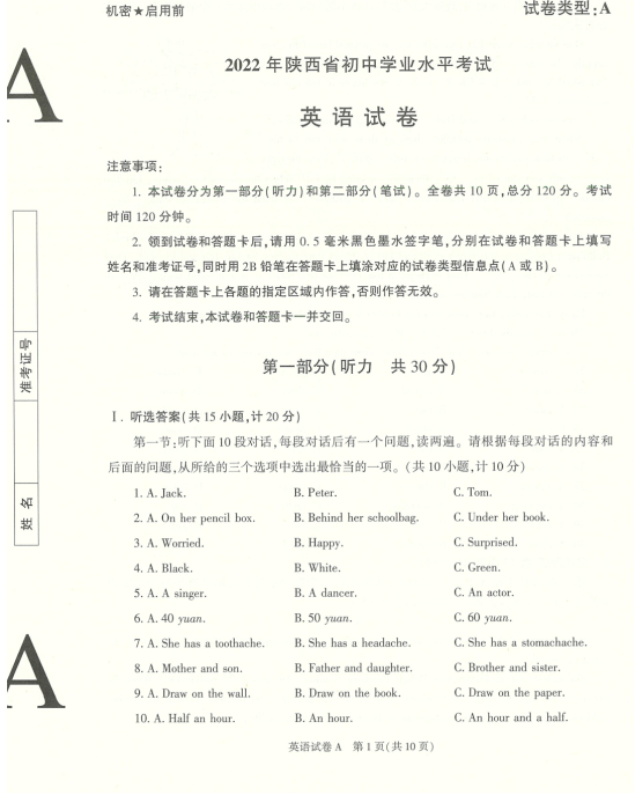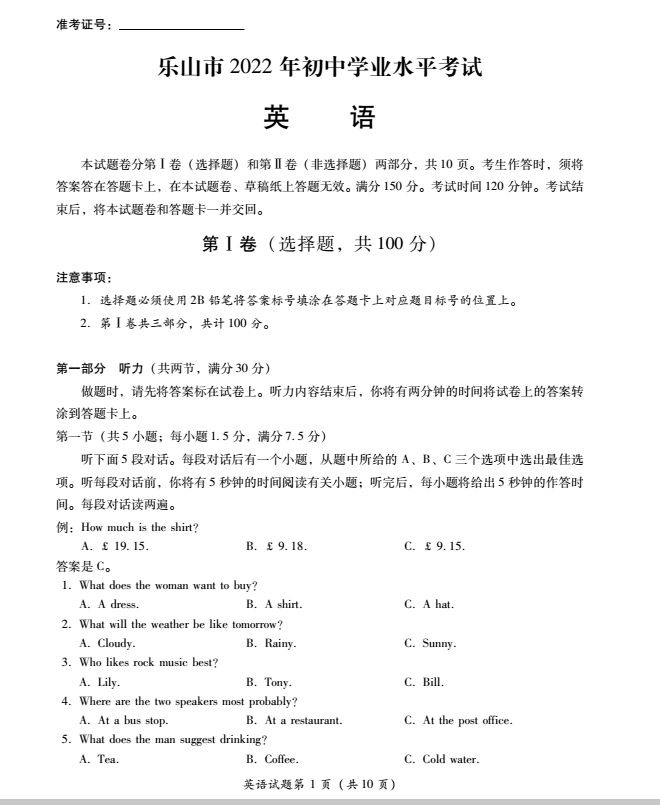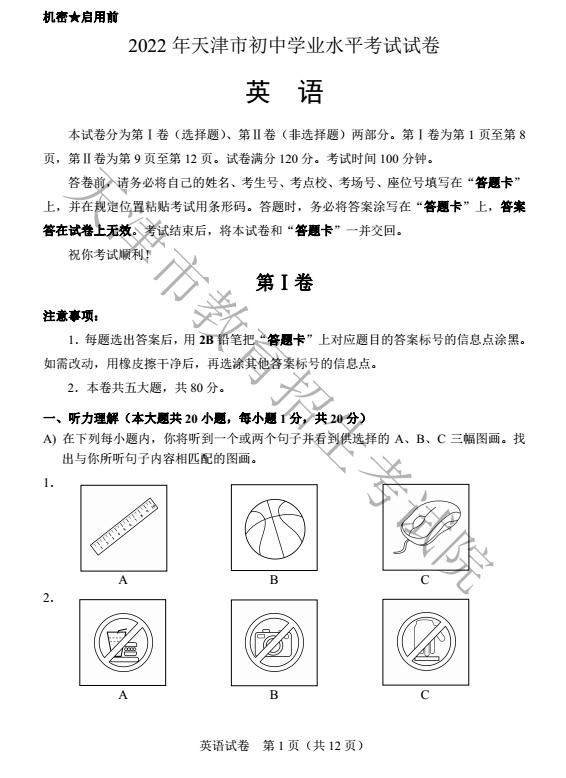1.asas常构成一些词组:as soon as(一旦就), as well as(同样), as+形容词/副词+as possible(尽量地)。如:Please ring me up as soon as you get to Beijing.(请你一到北京就给我写信。)/ Miss Gao hurried to the school gate as quickly as possible.(高小姐尽快地赶到了校门口。)
[注解] as long / much as + 名词可以表示长达/多达的意思。如:The house cosplayts as much as five hundred thousand yuan.(那幢房屋花费高达50万元。)/ They stayed in the cave(山洞)as long as two weeks.(他们呆在山洞里长达两周。)
2. later、after、ago、before的使用方法:①一段时间+later/ago分别表示(多长时间)将来/以前,主要用于过去时态。②after/before+某个时刻分别表示在某时刻之后/之前,此时两个词是介词。③ago与before:ago只可以用于过去时,before用于完成时。如:He had an accident a week ago.(一周前出了一个事故)/ Some years later, the boy became a very famous singer.(数年后这个男生成了著名的歌唱家)/ Have you been there before?(你以前到过那儿吗?)/ After a few years he gave up smoking.(过了几年他戒了烟。)
3.above、below、over、under的使用方法:在上下方用above和below,在高低处用over和under.如:The stars are high above in the sky.(星星高挂在空中) / A plane flew over quickly.(一架飞机从头顶飞过。)
当above、below、over、under是介词性质时,意义相似。
4. too、also、either、nor的使用方法:too(也)用于一定句和疑问句的末尾,且用逗号隔开;also(也)用于一定句句子谓语动词之前;either(也)用于否定句末尾,也用逗号隔开;nor(也不)用于倒装句句首;如:Are you American,too?(你也是美国人吗?)/ He is not happy and I am not happy, either.(他不愉快,我也不。) / He didnt watch the football game. Nor did I.(他没看足球赛,我也没。)/ You can also find the market is very good.(你还可以发觉那个市场非常不错。)
5. enough、too、so、very、quite、very much的使用方法: enough (足够,十分)放在形容词或副词之后;too(太)、very(很)、quite(相当)、so(这样地)等放在形容词或副词之前,very much(很)放在动词之后。如:Its too/so/very/quite expensive.(它太贵/那样贵/很贵/相当贵。)/ I dont like sweets very much.(我不非常喜欢糖果)
[注意] very与 much有什么区别:very修饰形容词、副词的原级和目前分词形容词,much修饰形容词和副词的比较级;much还可以修饰疑问句和否定句中的动词,very不能。如:He is very stupid.(他非常笨)/ The film was very moving and everyone swept.(电影很动人,大伙都哭了)/ You must work much harder or you will fail to enter the good school.(你得学习更努力,不然你考不进那所好学校)/ I dont like him much.(我不太喜欢他)
6. sometimes、 sometime、 some times 、some time的使用方法:sometimes(有时)用于一般目前时、 sometime(在以后某时)用于以后时、 some times(数次)表示次数、some time(一些时间)表示一段时间。如:Sometimes they go hiking in the mountains.(他们有时徒步旅游到山里去)/ I will stay here some time.(我会在这儿呆些时候的。)/ I will meet your father sometime.(我什么时间要见见你的爸爸。)
7. how、what用于感叹句的使用方法:对句子中的形容词或副词感叹时用how,对人或事物(可能含有形容词作修饰语)进行感叹用what. 如:What a fine day (it is) today!(今每天气真好!) / How difficult (the problem is)!((问题)真难呀!)
8.already、yet的使用方法:在完成时中,already一般用于一定句,yet一般用于否定句和疑问句。如:Have you done it already?(你已经做好了?) / I have not had my breakfast yet.(我还没吃早饭呢。)
9. hard与hardly的使用方法:hard作为副词意思是:努力地,猛烈地,hardly是不是定词,意思是:几乎不,一般与情态动词can/could连用。如:They study English very hard.(他们英语学得非常刻苦)/ You can hardly see a person spit in a public place.(在公共场合你几乎看不到一个人随地吐痰)
10. like...very much、like...better(=prefer)、like...best的使用方法:三个短语分别表示很喜欢、更喜欢、最喜欢。如:I like baseball very much.(我很喜欢棒球)/ Do you like butter better than cheese?( / They like hamburgers best.
11.quite/what+a+形容词+名词的使用方法:记住:①quite/such/what...+a+形容词+名词;②too/so/how+形容词+a+名词;③rather+a+形容词+名词 = a+ rather+形容词+名词。如:I have never seen such a strange guy(家伙).(我从未见过如此奇怪的家伙) / It is quite a nice day for a walk.(这真是散步的好日子)
12. how 的几个短语:how often多常,每隔多长时间,用于一般时态,对表示频度的词汇进行提问; how soon多长时间将来,用于以后时态; how long多长时间,用于过去时、完成时或其他时态; how many times多少次,用于过去时或完成时,对总计次数进行提问; how much多么,多少,对程度进行提问,也可以对数目(不可数)或资金进行提问。如:How long have you been like this?(你如此已经多长时间了?)/ How often does he wash his face?(他每隔多长时间洗一次脸?)
13. much、more与most的使用方法:这三个词除去是形容词作名词的修饰语以外,还是程度副词,much表示非常,修饰原级形/副,more表示更用来构成多音节形/副的比较级,most表示最用来构成多音节形/副的最高级。除此之外,much也可以修饰比较级形/副。如:This park is much more beautiful than that one.(这个公园比那个漂亮多了)/ It is the most instructive film I have ever seen.(这是我看过的最有教育意义的电影)
14. no more、no longer、not...any more、no...any longer的使用方法:表示时间,可以用no longer、not...ny more、no...any longer,而且no longer只能放在谓语动词之前;表示程度,可以用no more、not...any more.如:He no longer lived there.(他不再住在那里) / Tom wanted no more cakes.(他不想再要蛋糕) / He didn t smoke any more/longer.(他不再吸烟)
15.被动语态中,方法副词一般放在be与谓语动词之间。如: The runner was badly hurt.(赛跑运动员受了重伤) / English is widely spoken in the world today.(现在世界上英语说得非常广泛)
16.too...to...与so...that...的问题:副词too/so后面跟形容词或副词,to后面跟动词,that后面跟从句。Too...to... (太.以致不)是相反的结构,用于简单句;so...that...(这样以致)是一定结构,用于复合句。如:The child is too young to join the army.(这孩子年龄太小还不可以参军)/ He is so strong that he can lift the heavy box.(他这么强壮,搬得动那个重箱子。)
17. 既是形容词也是副词的单词有:early, late, long, last, next, first, near, enough, much, all, hard, alone, fast, slow, high, low, straight等等。如:It was a long holiday.(那是个长假)/ He stayed there very long.(他在那儿呆了好久)/ Think hard then you will find a way.(好好想你就会找到方法)/ He is a very hard(难应对的) person.(他是个难玩的家伙)
18. farther与further的使用方法不同:表示地址、方向或距离时两个词同义,意思为更远、较远,但further还表示更多、进一步、额外等意思,此时不可以换为farther. 如:They decided to go farther/further the next day.(他们决定第二天走得再远些)/ This problem will be further discussed.(这个问题还要进一步讨论)/ Every one of them had their further studies after they left college.(他们每一个人大学毕业后继续进修)
19. rather与quite的使用方法不同:同very一样,两个词都表示形容词或副词的程度,quite表示不到最高程度但比预料的好,rather比quite更接近very的意思,含有让人惊讶的意思。见下图对nice程度的描绘:
not nice (fairly) nice quite nice rather nice very nice
如:Its quite a nice film.(这是部好片子)。(可能意味着不是一部最好的电影) / Its rather a nice film.(这是部很好的电影。)(意味着比大部分电影都好)
[注意]注意quite与rather后面的次序词序。
20. maybe、possibly、perhaps有什么区别:maybe可能、或许,比另外两个词更不正式、更随意、可能性不大;possibly可能地、或者、或许,可能性较大,在否定句和疑问句中表示无论怎么样;perhaps可能,较为常用而且正式,可能性也不大。如:You could put it over there,maybe.(或许你可以把它放在那边) / I couldnt possibly have finished such a long book in such a short time.(我不可能在这么短的时间内完成这么长的一本书)/ I thought perhaps it was the letter you have been expecting.(我以为那或许就是你期盼的信件)
21. most、mostly有什么区别:most作为形容词和名词时意思是大部分的、大多数的,作为副词时意思为最,十分、非常;mostly仅为副词,意思为主要地、多半地、大多数地。如:I was at home most of the time when I was free.(我有空时大多数时间都在家)Most children are naughty.(大多数的孩子都淘气)/ This is the most exciting part of the film.(这是电影中最让人开心的部分)/She is mostly out on Sundays.(星期天她一般不在家)
22. (be) worth、(be) worthy of有什么区别:worth一般被看作是介词,后面接名词或者动名词,用主动表示被动含义,还可以用副词well修饰;worthy of表示值得的、配得上的,后面跟动名词的被动形式。如:What is worth doing at all is worth doing well(但凡值得做的,就值得好好去做). / The house is worth ¥300,000.(房屋价值30万元)/ This book is well worth reading several times.(这本书值得好好读几遍)/ It is a thing worthy of being seen.(这是一个值得看的东西)
23.almost、nearly有什么区别:两个词意思相近,都表示几乎、将近,大部分状况下可以互换,与否定词连用时用almost不需要nearly. almost no 等于hardly any(几乎没)。如:He had done almost nothing today.(他今天几乎没做什么) / We are almost/nearly there.(大家几乎就到那里了)/ Almost nobody/Hardly anybody understood his words.(几乎无人懂他的话)
24.a bit与a little有什么区别:这两个名词短语常常当作副词用,修饰形容词或副词的原级或比较级,可以互换,语气比rather弱。如:This digital camera is a bit(a little) expensive.(这台数码相机有点贵)/ It is a little(a bit) colder than yesterday.(今天比昨天冷了点)
另外,a little可以直接加不可数名词,a bit 则使用a bit + of +名词(不可数或可数名词复数)的形式。如:I have got a bit of a cold.(我有点感冒)/ Go and get a little water for me, please.(请你去给我搞点水来)
[注意] not a bit(=not at all)意为根本不,而 not a little则意为很,不是一点。
有关推荐:
2022年中考各科目重点常识大全
关注中考网公众号
每天推送中考要点,应试方法
帮你迎接2022年中考!




